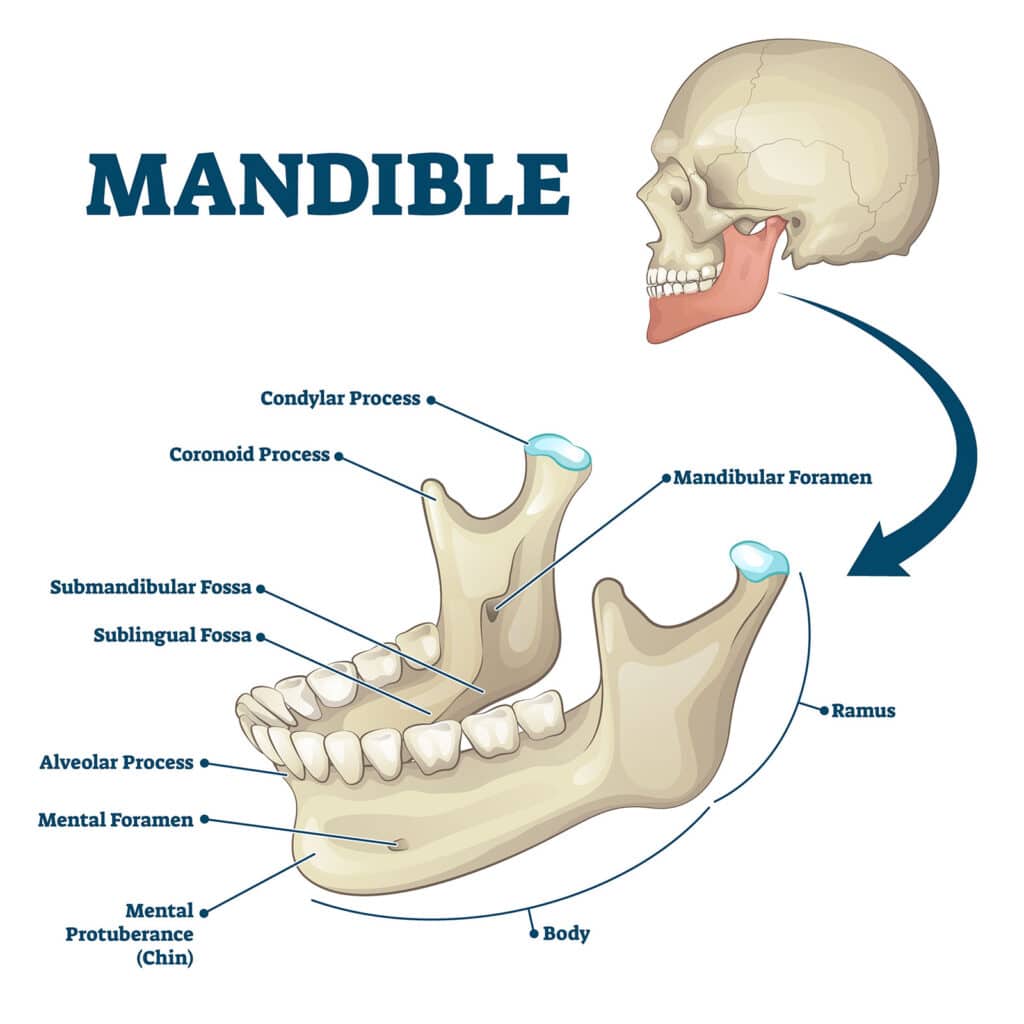Cocaine is the second-most trafficked illicit substance in the world. Highly addictive, it only takes a few uses to make someone dependent on the drug.
Although the euphoric effects seem like fun for the recreational user, they often don’t realize the dangerous side effects that can also occur. For example, a condition called coke jaw is one of the main giveaways of a loved one’s addiction.
Table of Contents
Cocaine
Cocaine is a powerfully-addictive stimulant made with coca plant leaves from South America. Although healthcare providers can use the drug for valid medical purposes, such as local anesthesia for certain surgeries, it is illegal to use it recreationally.
As a street drug, cocaine is a fine, white powder often mixed with inert substances like talcum powder, cornstarch, or flour to stretch inventory. Dealers may combine it with synthetic opioids like fentanyl or other drugs like amphetamine. Mixing cocaine with synthetic opioids is especially dangerous to those who don’t realize their drugs include additives.
How do people use cocaine?
Typically, people snort the powder through the nose or rub it into their gums. Some instead inject it into the bloodstream after dissolving the powder in liquid. Others may inject cocaine combined with heroin, a mix known as a speedball.

It is also common for people to smoke cocaine processed into a so-called rock crystal, at which point it’s known as freebase cocaine. This crystal is heated, producing vapors that a person inhales; this form of cocaine is called crack, referring to the namesake sound the drug makes under heat. Others may smoke crack by sprinkling it in tobacco or marijuana cigarettes.
Those who use cocaine will often take the drug in frequent binges, meaning they use it at increasingly higher doses within a short period to maintain their high. Cocaine binges can lead to serious side effects.
Coke Jaw
Cocaine is a powerful stimulant that speeds up the entire body. Side effects include jaw clenching and muscle twitching in the face, a condition known as coke jaw.
A person with this condition will visibly grind their mouth from side to side, leading to further health issues.
Withdrawal Symptoms and Side Effects
Coke jaw is a debilitating condition that can have potentially fatal side effects.
Bruxism
Many people grind their teeth without realizing it, and it can happen day or night. People who use cocaine grind their teeth more frequently than usual. The bruxism caused by excessive cocaine consumption leads to various dental problems, including worn enamel, cavities, tooth loss, dental erosion, and broken teeth. Using cocaine is also a leading cause of jaw pain.

Periodontitis
Some people prefer to rub cocaine onto their gums instead of ingesting it, aiming to achieve a faster high. This method works because any mucus cavity functions as an accelerant for cocaine. However, putting drugs on your gums runs the risk of causing inflammation. Inflamed gums can develop periodontal disease, a serious condition that damages supporting tissue; cocaine causes the tissue and bone beneath to be absorbed, receding the gum line and loosening teeth that can fall out.
Oral Palate Perforation
Those who snort cocaine through the nose experience constriction in the blood vessels carrying oxygen to the region. Without enough oxygen, the cells in the septum can’t sustain themselves and die, leading to necrosis and causing the septum to deteriorate in the nasal cavity. Perforation of the oral palate occurs when the roof of the mouth sinks in, making it difficult to speak, swallow, and eat.
Dry Mouth
Cocaine use decreases saliva production (saliva flow), causing dry mouth. At first, this condition doesn’t seem serious, but chronic dryness can lead to bleeding gums, gum disease, and tooth decay.
Side Effects of Cocaine Use
Cocaine use artificially increases levels of the natural chemical dopamine in brain circuits.
Usually, dopamine returns to the released cell, shutting the signal between the nerves. But cocaine prevents this recycling process, instead causing large quantities to develop between two nerve cells, disrupting their communication. Flooding the brain with dopamine reinforces the behaviors, leading to continued, often worsened, use as a person builds a tolerance to the drug.
Short-Term Side Effects of Cocaine Use
Using cocaine results in several short-term effects:
- Mental alertness
- Extreme energy and happiness
- Irritability
- Weight loss
- Hypersensitivity to sound, sight, and touch
- Extreme paranoia and unreasonable mistrust of others
Some claim cocaine helps them perform simple mental and physical tasks more efficiently, while others report experiencing the opposite effect. As a result, large quantities of the drug can lead to unpredictable, bizarre, and even violent behavior.

The effects of cocaine start almost immediately, disappearing within an hour. The intensity of the effects and how long they last depend on the method used to consume the drug. In particular, smoking or injecting cocaine leads to a more potent but shorter-lasting high than snorting powder; the high from snorting cocaine powder may last as long as 30 minutes, but the high from smoking dissipates after as few as five.
How does cocaine use impact physical health in the short term?
Using cocaine can result in several physical health effects, including:
- Nausea
- Restlessness
- Dilated pupils
- Constricted blood vessels
- Raised body temperature
- High blood pressure
- Tremors and muscle twitches
- Irregular or rapid heartbeat (heart attack)
Long-Term Side Effects of Cocaine Use
The long-term effects of cocaine use on physical health depend on how it’s consumed. The impacts may include:
- Snorting: Nosebleeds, loss of smell, frequently runny nose, and difficulty swallowing, speaking, or eating (coke jaw)
- Smoking: Respiratory distress, asthma, cough, and an increased risk of lung infections like pneumonia
- Needle injection: Increased risk of developing bloodborne diseases like HIV and hepatitis C, collapsed veins and scarring
While those who inject needles are at greater risk of contracting a bloodborne illness, even those who consume cocaine by other means place themselves at risk; the drug heavily impairs judgment, leading to risky behavior with infected partners.

In the long-term, cocaine can result in malnourishment because cocaine reduces appetite and jaw movement disorders that can occur after years of use, including Parkinson’s disease. Additionally, some people report restlessness and irritability from cocaine binges. Finally, others may experience auditory hallucinations, hearing noises that don’t exist, and severe paranoia, losing touch with reality.
Treating Coke Jaw
Licensed medical professionals can treat most of coke jaw’s impacts on the body. For example, a dentist can treat gum disease with a deep cleaning, repair cracked teeth, and fill cavities that formed from teeth grinding while on cocaine. Other effects are more challenging to treat; for example, treating a perforated oral palate usually requires surgery.
If you’re struggling with coke jaw and its effects, you must discuss the issue with your healthcare provider immediately; they can determine the treatments you’ll need. However, coke jaw is ultimately not a dental issue to tackle; it’s a substance use problem. In other words, you must stop using cocaine to prevent coke jaw from returning.
Getting Treatment for Cocaine Addiction
A person often starts using cocaine to feel the intense euphoria it creates. Almost immediately, cocaine use leads to happiness, feeling more energetic, and increased confidence. Because of these effects, cocaine is considered one of the most dangerous drugs in the world; the allure is powerful, but every day, someone who intends to use the drug recreationally becomes hooked.

No two drugs, people, or addictions are alike, so it’s essential to receive treatment from a facility that takes a personalized approach. A person’s individualized care may include any combination of the following proven methods:
- Individual and family counseling
- Group discussions
- Holistic methods
- 12-step group models
- Yoga and exercise classes
- Reiki therapy
- Diet and nutrition counseling
Behavioral therapy is also often included when treating cocaine. Some examples include:
- Cognitive behavior therapy: Talk therapy
- Therapeutic communities: Drug-free homes in which recovering residents help each other learn more about and change their behaviors
- Contingency incentives: Rewards for those who stay substance-free
Contact Illinois Recovery Center Today
Cocaine addiction can manifest in complicated ways that challenge you to your core. At Illinois Recovery Center, we understand that every person, every condition, and every story is different. That’s why we take a personalized approach to treatment, tackling the root causes that directly impact someone and the factors that influence their decision-making.
Sobriety requires consistent support from everyone involved, so. Contact us at Illinois Recovery Center today to learn more. Our staff will answer all your questions and provide essential information for your next steps.
FAQ
What is coke jaw?
What causes coke jaw?
What does coke jaw look like?
How to stop coke jaw?
Does cocaine abuse cause headaches?
Crack cocaine effects on the brain?
Published on: 2022-10-12
Updated on: 2024-07-12



